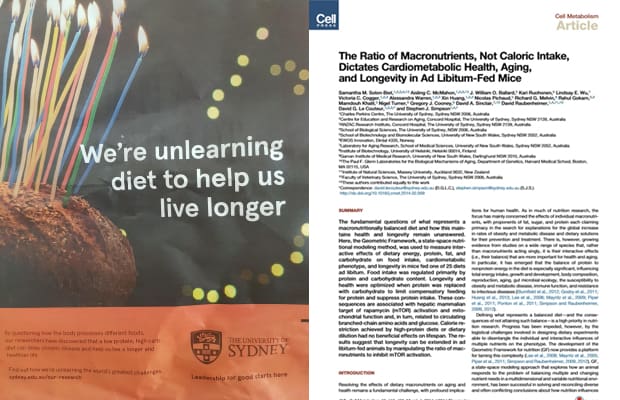Former Reserve Bank Economist and well-known anti-sugar campaigner Rory Robertson — who first exposed fundamental issues with the 2011 Australian Paradox study — is back, this time avowing concerns towards a 2014 Charles Perkins Centre (CPC) study and Australia’s peak medical research body has asked the University of Sydney (USyd) to investigate.
The study, titled The Ratio of Macronutrients, Not Caloric Intake Dictates Cardiometabolic Health, Aging, and Longevity in Ad Libitum-Fed Mice was funded by a grant from the peak body, the National Health and Medical Research Council (NHMRC), and published in the Cell Metabolism Journal.
30 unique diets — differing systematically in protein, carbohydrate, fat content, and energy density — were fed to mice to understand each diet’s impact on lifespan. The paper contends, amongst other things, that low-protein, high-carbohydrate diets are associated with the longest lifespans in mice. The findings gained widespread publicity back in 2014 in the mainstream press, as well as featuring in the University’s “Unlearn” campaign.
Robertson’s concerns originated earlier this year when he wrote to the Journal’s editorial board, alleging the “misrepresentation of longevity results.”
“Critically, the authors claim falsely that ‘median lifespan was greatest’ on diets ‘low in protein and high in carbohydrate.’ You can see that median lifespan was actually greatest on a diet high in protein (42%) and low in carbohydrate (29%),” said Robertson in the letter. “The senior authors should formally retract the paper and then rewrite it, properly presenting and discussing the actual median lifespan results.”
“The problem of eminent but incompetent research goes to the very top of nutrition science in Australia,” Robertson told Honi.
His concerns have been largely ignored for now. They were rapidly rebutted by the University and described as “unfounded” by Professor Stephen Simpson, one of the authors of the study and Academic Director of CPC.
Robertson was also at the centre of previous allegations against the 2011 Australian Paradox study authored by senior nutritionists at the University of Sydney. That study — described by Robertson as a “menace to public health” and defended by Vice-Chancellor Michael Spence as “independently and objectively peer-reviewed prior to its publication” in an email at the time — found there was no connection between obesity and sugar intake.
Australian Paradox was used by the Australian sugar lobby, including the Australian Beverages Council to argue against a sugar tax, before scientists at the University of Western Australia found the study’s assertions to be based on incomplete data. That study went on to be investigated by the ABC and an independent inquiry recommended a revision to the paper in 2014.
A University spokesperson declined to comment on the progress of the University’s current investigation but noted it was considering Robertson’s latest concerns in accordance with the University’s Research Code of Conduct and the Australian Code for the Responsible Conduct of Research.
“We note the authors of the [2014] paper continue to reject Mr Robertson’s claims as profoundly misconceived and unfounded.”
“The findings of the study are supported by various works from independent research groups. The study is highly cited in the field of the biology of ageing.”
“No questions have been raised by members of the board or other members of the scientific community,” the spokesperson said.
Whether the mouse diet study turns out like Australian Paradox, only time will tell.





